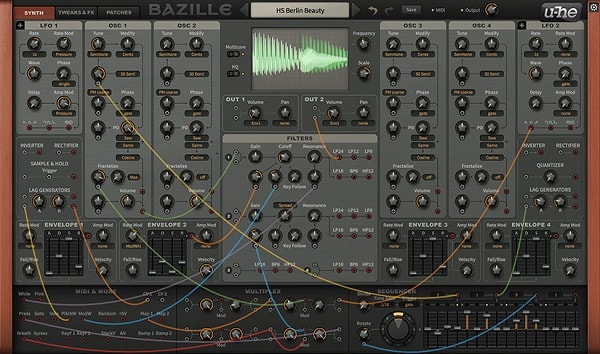
u-he Bazille v1.1.2.12092 VST2 VST3 AAX [WIN]
Bazille: Monster from the deep
The second spawn of the Berlin Modular project, Bazille is a large polyphonic modular system with digital (PD, FM based) oscillators, multimode filters and plenty of modulation options. With so much connectivity to explore, patching in Bazille should keep you fascinated for many years – it’s definitely a “geek machine”!
Bazille in the spotlight…
- modular, stereo, up to 16-voice polyphonic
- 4 digital oscillators based on phase distortion (PD) with FM and fractal resonance (FR)
- 4 self-oscillating multimode filters with up to 6 parallel outputs each
- 4 ADSR envelopes with Fall/Rise for the sustain stage, overall rate can be modulated
- 2 LFOs with 3 parallel outputs each, unipolar option
- 16-step morphing sequence per voice, with 8 snapshots and 4 output taps
- 2 mapping generators with up to 128 steps, comprehensive drawing tools, presets…
- maps can be used as oscillator waveforms
- 4 Multiplex modules for mixing signals, cross-fading, ring modulation, amplitude modulation etc.
- 4 effects: stereo delay, distortion (6 types), phaser (2 types), spring reverb
- 2x inverter, 2x rectifier, sample & hold, 2x twin lag generators, quantizer
- over 1700 factory presets
Bazille is a large modular system combining digital oscillators with analogue-style filters and modelled effects, with a flexibility that only modular patching can provide. After ACE, the second spawn of our ongoing Berlin Modular project, this one is a very different, much larger beast…
Features
Ultraflexible modules
Bazille is highly unusual for a modular synth.
Although the filters are traditional analogue models, the oscillators are unashamedly digital: They combine the two technologies that made digital synthesis affordable (and analogue synths suddenly unfashionable) in the
1980s – FM (frequency modulation, more correctly ‘phase modulation’) and PD (phase distortion).
In Bazille, each oscillator panel has five distinct sections:
Pitch, Phase / FM, Phase Distortion, Fractal Resonance, and the Outputs, each with a modulation input.
Since the 4 main oscillators have a frequency range which starts at zero Hertz, they can be used as synchronized or unsynchronized LFOs or also adopt custom shapes thanks to Bazille’s mapping generators. The oscillators are also capable of all kinds of FM sounds by plugging an audio-frequency source into the phase modulation input.
One of the most interesting features included in Bazille’s powerful oscillators is an unusual process we call Fractalize (fractal resonance). This can be used to create very bold sounds from tame waveforms, with a similar result to the classic cutting sound of the sync effect.
Mapping generators
The pair of Mapping Generators can be used for a variety of purposes: To reshape modulation sources, to define per-MIDI-note offsets or to step through values e.g. for round-robin effects… There are 4 modes available, and both generators can have maps with up to 128 steps. They are very flexible, allowing custom shapes thanks to the drawing tools and presets accessible with a right-click of the mouse.
Multiplex
The little multiple” modules you can find in most analogue modular systems are simple mix/split devices. As Bazille’s output sockets can accommodate several cables, the humble multiple underwent a serious redesign, emerging as something so flexible that we had to rename it Multiplex. The 4 units are very “general-purpose”: They can be used as signal mixers, cross faders, ring modulators, amplitude modulators, and more…
Modulation sequencer
The onboard modulation sequencer lets you set up much more complex movements than are available with a regular LFO. It can be divided into 2, 3 or 4 sections, two of which can also be used as a per-voice note sequencers (steps can trigger envelopes). Also present is a modulatable Rotate control, which lets you morph between up to 8 different sequences.
Alternative skin
Would you prefer all controls on a single page?
Bazille ships with a larger but more compact skin called GearPorn which dramatically alters the user experience. Ideal for Bazille experts, the skin of choice for ambitious novices.
To enable the skin, just right-click on Bazille’s interface and select it from the menu.
Requirements
Host software / DAW
1GB RAM, more recommended
50MB free disk space
1000 × 600 or larger display
Modern CPU required:
Windows/Linux: Intel Nehalem or newer, AMD Bulldozer or newer
Demo Preview:
